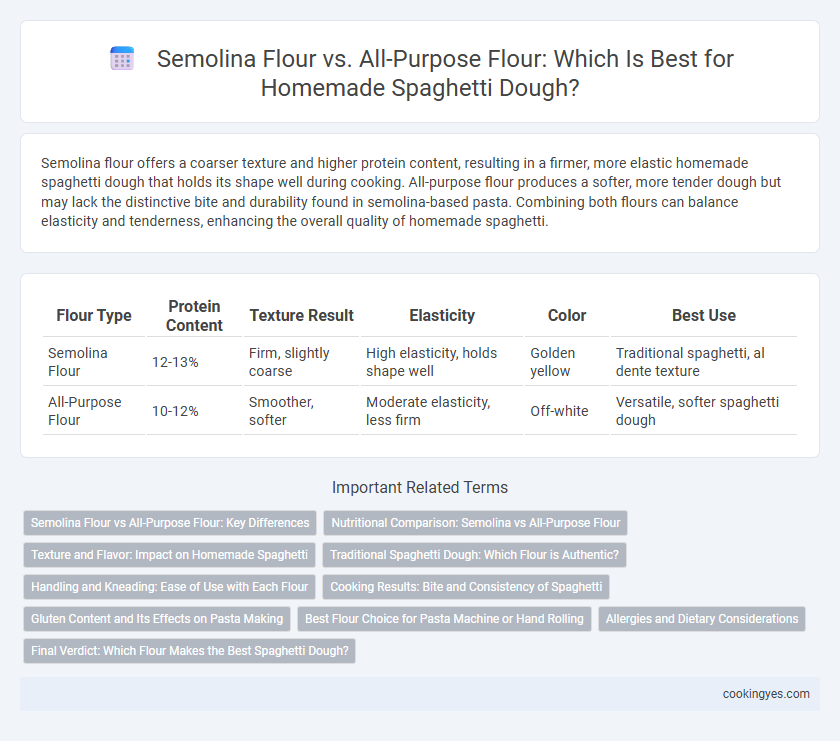Semolina flour offers a coarser texture and higher protein content, resulting in a firmer, more elastic homemade spaghetti dough that holds its shape well during cooking. All-purpose flour produces a softer, more tender dough but may lack the distinctive bite and durability found in semolina-based pasta. Combining both flours can balance elasticity and tenderness, enhancing the overall quality of homemade spaghetti.
Table of Comparison
| Flour Type | Protein Content | Texture Result | Elasticity | Color | Best Use |
|---|---|---|---|---|---|
| Semolina Flour | 12-13% | Firm, slightly coarse | High elasticity, holds shape well | Golden yellow | Traditional spaghetti, al dente texture |
| All-Purpose Flour | 10-12% | Smoother, softer | Moderate elasticity, less firm | Off-white | Versatile, softer spaghetti dough |
Semolina Flour vs All-Purpose Flour: Key Differences
Semolina flour, made from durum wheat, offers a coarser texture and higher protein content that results in a firmer and more elastic homemade spaghetti dough, ideal for traditional pasta shapes. All-purpose flour has a finer grind and moderate protein level, producing a softer, less chewy dough suitable for a delicate pasta texture. Choosing semolina flour enhances the pasta's firmness and bite, while all-purpose flour yields a tender, melt-in-your-mouth noodle.
Nutritional Comparison: Semolina vs All-Purpose Flour
Semolina flour contains higher protein and gluten content than all-purpose flour, making it ideal for firm, elastic homemade spaghetti dough. Semolina is rich in complex carbohydrates, B vitamins, and minerals like iron and magnesium, contributing to better nutritional value compared to all-purpose flour, which is more refined and lower in fiber. Choosing semolina enhances both the texture and nutrient density of your spaghetti, supporting sustained energy release and digestive health.
Texture and Flavor: Impact on Homemade Spaghetti
Semolina flour, derived from durum wheat, imparts a firm, slightly gritty texture and a rich, nutty flavor to homemade spaghetti, enhancing its al dente bite and authenticity. All-purpose flour produces a softer, more elastic dough that results in a smoother texture but milder taste. Choosing semolina flour elevates traditional spaghetti by offering superior texture and a distinctive, robust flavor profile.
Traditional Spaghetti Dough: Which Flour is Authentic?
Traditional spaghetti dough is authentically made with semolina flour, prized for its coarse texture and high gluten content that provides the ideal firmness and bite. Semolina flour, derived from durum wheat, offers a rich, slightly nutty flavor essential for classic Italian pasta. All-purpose flour, while more versatile and softer, lacks the structural strength and distinctive taste necessary to replicate authentic homemade spaghetti.
Handling and Kneading: Ease of Use with Each Flour
Semolina flour, made from durum wheat, provides a coarser texture that offers more grip and structure during handling and kneading, making the dough easier to work with for traditional, firm spaghetti strands. All-purpose flour produces a softer, more elastic dough that requires less effort to knead but may result in a less firm pasta texture. Choosing semolina enhances dough firmness and bite, while all-purpose flour simplifies the kneading process but can yield a more tender spaghetti.
Cooking Results: Bite and Consistency of Spaghetti
Semolina flour, derived from durum wheat, provides homemade spaghetti dough with a firmer bite and a slightly coarse texture, ideal for holding sauce and resisting overcooking. All-purpose flour yields softer, more tender spaghetti with a smoother consistency but can become mushy if overcooked. The higher protein content in semolina flour enhances gluten formation, resulting in spaghetti strands that maintain their shape and offer a more al dente cooking experience.
Gluten Content and Its Effects on Pasta Making
Semolina flour, derived from durum wheat, contains a higher protein and gluten content than all-purpose flour, resulting in dough with increased elasticity and strength, ideal for holding shape during cooking. The gluten network formed by semolina provides a firm, al dente texture in homemade spaghetti, whereas all-purpose flour, with moderate gluten levels, produces softer, more tender pasta that can be prone to overcooking. Choosing semolina flour enhances the dough's ability to withstand boiling, maintain a chewy bite, and achieve authentic Italian pasta quality.
Best Flour Choice for Pasta Machine or Hand Rolling
Semolina flour is ideal for homemade spaghetti dough as its coarse texture and high protein content create a firm, elastic dough that maintains shape well when extruded through a pasta machine or hand-rolled. All-purpose flour produces a softer, less resilient dough that can be stickier and more difficult to handle, especially with a pasta machine. For the best results and traditional texture in spaghetti, semolina flour is the preferred choice, offering superior structure and bite.
Allergies and Dietary Considerations
Semolina flour, derived from durum wheat, contains higher gluten levels and may trigger allergies in individuals sensitive to gluten or wheat proteins, making it unsuitable for those with celiac disease or wheat allergies. All-purpose flour, typically made from a blend of hard and soft wheat, has a lower protein content but still contains gluten, posing similar allergy risks. For gluten-free or allergen-sensitive diets, alternative flours like rice or chickpea flour are recommended for homemade spaghetti dough to avoid adverse reactions.
Final Verdict: Which Flour Makes the Best Spaghetti Dough?
Semolina flour, made from durum wheat, provides a coarser texture and higher protein content that yields firmer, al dente spaghetti with a slightly nutty flavor, ideal for traditional homemade pasta. All-purpose flour, while more versatile and smoother in texture, produces a softer dough that can be easier to handle but lacks the distinct bite and resilience of semolina-based dough. For authentic, durable spaghetti that holds sauce well and maintains its structure during cooking, semolina flour is the preferred choice among pasta enthusiasts and chefs.
Semolina flour vs All-purpose flour for Homemade spaghetti dough Infographic

 cookingyes.com
cookingyes.com